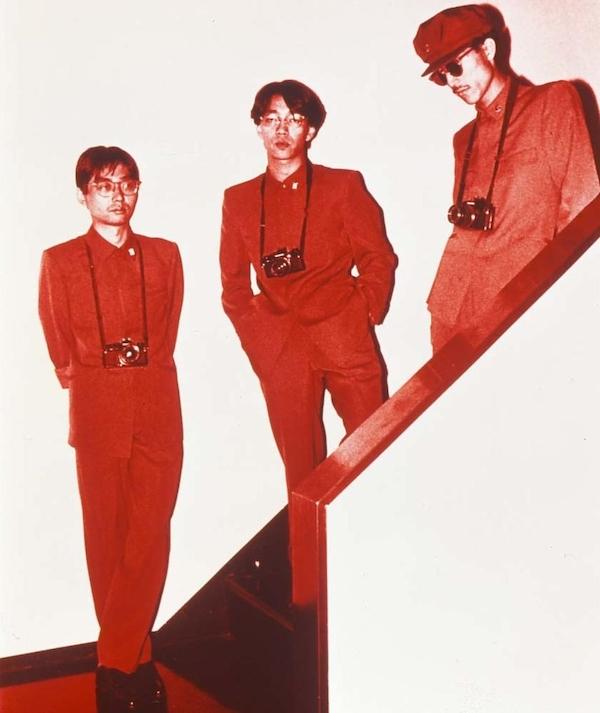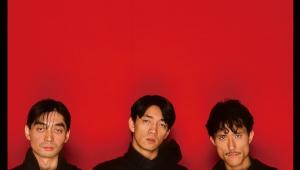pay later
Yellow Magic Orchestra: Prologue

Haruomi Hosono
Already a known figure, prior to YMO’s formation Haruomi Hosono spent a decade in the music industry. Initially the bassist for the short-lived psych rock band Apryl Fool (whose 1969 sole album takes heavily from the Yardbirds and Cream), he then formed Happy End, a folk-rock group recognized as the first popular Japanese rock band to (controversially) sing in Japanese. By the mid-70s, Hosono worked as a solo artist, record producer (helping craft the studio-polished Japanese jazz-pop sound now called city pop), and started another band, Tin Pan Alley. Throughout the decade, he played with Western “exotica” stereotypes of Asian music. He told The Guardian in 2008, “The thing was to take these Western ideas of the exotic, but to subvert them. With Martin Denny, the exotica is kind of fake. But I am real! I am the target of that Western exotica. So what I wanted to make was exotica from an oriental perspective.”
Most important to the YMO story are Hosono’s 1978 releases Paraiso (released in April), Pacific (a CBS/Sony Sound Image release with Tatsuro Yamashita and Happy End guitarist Shigeru Suzuki, released in June), and Cochin Moon (released in September). Paraiso is exotica-influenced city pop with Hosono’s first synthesizer experiments including the first simultaneous collaboration between him, Takahashi, and Sakamoto (the subtly funky “Femme Fatale”). Hosono’s contributions to Pacific, a record designed to evoke Pacific beaches, blend faux-nostalgia-inducing synth-based tropical exotica and jazz fusion that lives on through the infamous YouTube algorithm. Around this time, a trip to India with illustrator Tadanori Yokoo resulted in a severe diarrhea outbreak, influencing Cochin Moon, Hosono’s most bizarre 70s work. Soundtracking a fictional Bollywood film, it’s a dizzying suite of entirely synth-based psychedelic music, with accompaniment by Ryuichi Sakamoto, keyboardist Hiroshi Sato (known for 1981’s city pop classic Awakening), and programmer Hideki Matsutake.
Yukihiro Takahashi
The drummer for the funk and jazz rock-based Sadistic Mika Band (and later its fusion/pop spinoff, the Sadistics), Yukihiro Takahashi also recorded a 1978 solo album, Saravah!. Taking strong cues from French vocal jazz, Saravah! is enjoyable albeit cheesy and dated, with Takahashi’s vocals a notable weakness (dissatisfied with the original, for 2018’s remix/remaster Saravah Saravah! he re-recorded his vocals). Still, it’s a worthy listen that features the other YMO members plus Shigeru Suzuki, Kenji Omura, Tatsuro Yamashita (“the king of city pop”), and Minako Yoshida. Listen to Takahashi’s “Mood Indigo” rendition below:
Ryuichi Sakamoto
In 1970, Ryuichi Sakamoto commenced studies at the Tokyo National University of Fine Arts and Music, earning a bachelor’s degree in music composition and a master’s degree in electronic and ethnic music. Sakamoto worked as an arranger for pop artists such as Taeko Ohnuki , but soon recorded his own compositions. Thousand Knives of Ryuichi Sakamoto, accompanied by Hideki Matsutake and guitarist Kazumi Watanabe, dropped a month before YMO’s self-titled Japanese debut. A progressive electronic LP thematically exploring China’s Cultural Revolution, Thousand Knives’ syncopated layers of minimalist analog synthesizers are immaculately structured; with percussive sound effects and tight basslines, the stereo mix renders the sophisticated compositions immersive and accessible. While not consistently excellent, the album includes “Thousand Knives” and “The End Of Asia,” both standards of Sakamoto’s discography.
Stay tuned for AnalogPlanet’s exploration of Yellow Magic Orchestra’s 1978-1981 releases, to be posted later this week.
(Malachi Lui is an AnalogPlanet contributing editor, music lover, and avid record collector. He’s highly anticipating Kanye West’s upcoming DONDA, assuming it even drops. Follow Malachi on Twitter: @MalachiLui and Instagram: @malachi__lui)
- Log in or register to post comments

These guys were long overdue for a retrospective appraisal so kudos to Mr. Lui. I'm puzzled, though, by the omission of 'Hosono House', a sublime melange of SoCal country rock, 70s AM pop/soul/funk and a dash of Little Feat. For my money it's his best record.

it's a very good record (i own the LITA vinyl reissue, maybe i'll put it in a vinyl reports feature someday), though it fits more into the happy end story than the YMO story. i did acknowledge that there was other pre-YMO hosono stuff aside from 'paraiso'/'pacific'/'cochin moon' but those three records were most relevant to the YMO story. i could fill up several more features if i wanted to go in-depth on happy end, tin pan alley, and 1973-1976 solo hosono (specifically the "tropical" stuff). those features are for another time... hosono is amazingly prolific so it's hard to write about even a decade of his career at once.

Little Feet and So Cal County Rock.... distinction without a difference???

The Feat certainly had roots in Southern California, and a tiny whiff of country in their sound, but they were MUCH funkier, swampier and more rockin' than the Eagles and their ilk. Some songs reveal a familiarity with jazz that completely escaped the other SoCal bands. They also had a very strong blues streak (A Apolitical Blues etc. and Lowell's wonderful slide guitar work) along with some experimental Zappa influence, especially in their early days.
BTW, the "classic" lineup was one of the best live bands I've ever seen. Man, they could tear it up!

I'm one of those guys who discount genre labels....The musicians normally don't care for or abide by the use of genres. As my boys XTC stated early on..."This is Pop"...it's all pop music, more similar than different. I too saw/heard the late 70s version of Little Feet live...good group, good songs, not great improvisers and a fun evening.

If "Shimendoka" isn't actually "Time Loves a Hero," I will eat my feet!

You explained it succinctly, correctly (in my view, anyway) and better than I would have done. Thanks for saving me the trouble.
By the way I saw the post-Lowell iteration many years ago and they were incapable of, or uninterested in, engaging the audience. They almost seemed to be showing off for each other and the show was little more than heads-down boogie with a few clever changes thrown in. At the risk of having the internet drop on my head, I'll call it Jeff Beck syndrome.

Thank you Malachi for turning me onto Cochin Moon. Super melodic, and possibly the widest soundstaged recording I've ever heard.












































